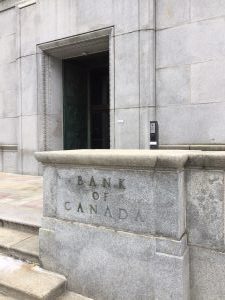
If you have a mortgage that floats with prime rate, the constant chatter about rate hikes may be unnerving.
Well, now you can take a breather—because the Bank of Canada has taken a breather.
The Bank left rates alone today and hinted that future rate hikes may be further off than economic forecasts suggested.
If you had to sum up its announcement today in one paragraph, it might be this:
Inflation has inched higher but it’s far from too hot. Growth has exceeded expectations but it should moderate given weaker spending, slowing housing, “high debt levels,” and “substantial uncertainty.” Rate hikes are likely “over time” but the Bank will be very “cautious” about lifting too much.
English translation:
- The Bank got back its 50 bps of rate cuts from 2015, and it’s now content with the current level of rates
- Don’t expect a rate hike until next year, if we get one in 2018 at all
How to play it:
- If you’re a financially secure, risk-tolerant borrower:
- Forget about locking in your variable rate. Keep surfing the low-rate wave
- If you can snag a short-term fixed or variable mortgage rate near 2.30% or less, jump on it
- The BoC would have to hike at least 1 point or more in the next 12-18 months for this strategy to fail you, based on interest cost alone
- If your finances aren’t as sound:
- Stress test your mortgage payments
- If you can’t handle a meaningful rate hike by the end of your mortgage term, and you don’t plan to move or refinance before five years, take the best 5-year fixed rate you can get (lean towards lenders with “fair” mortgage penalties in case you have to break early)
- Extend your amortization as long as you can to maximize cash flow (you can always make prepayments to reduce your effective amortization later)
Who Not to Listen To
Lots of commentators keep saying “low rates won’t last forever.” Ignore these clichés if you’re financially secure and you don’t need to lock in. Such banality adds no value because most “experts”:
- Have no clue where rates are going
- Don’t understand that you’re making a mortgage decision for only the next five years, or less
- Rarely mathematically calculate the risk/reward of short/variable rates versus longer-term fixed rates
- Fail to acknowledge that rates can stay exceptionally low well into the future thanks to structural (disinflationary and deflationary) macro-economic changes, demographics, overborrowing (i.e., consumer interest-rate sensitivity), and so on.
Are higher rates possible? Absolutely. But term selection is about playing the odds and the odds of 1+ percentage point hikes in the next year or two are questionable at best. If you’re a creditworthy borrower with a financial safety net, stay short or variable…for now.
One Big Wildcard
The Bank cited OSFI’s coming mortgage stress test as a risk to inflation and, hence, the economy. It said today, “There is considerable uncertainty around the overall impact of these measures on the economy because it is difficult to forecast the change in behaviour of borrowers and lenders.”
Without a doubt, the government’s new rules will slow demand, raise borrowing costs and act like a 2-point rate hike for conventional borrowers trying to qualify for a mortgage. In terms of housing effect, OSFI’s B-20 rules will have far more impact than a few rate hikes ever could.

 log in
log in

5 Comments
I distinctly remember gleeful forecasts not so long ago boasting the roaring economy and how we could expect 4 or more cumulative rate hikes over 2017-18. I was skeptical that the economy and debt-burdened consumers could handle such a rapid rise in rates and, well, I guess I wasn’t so wrong.
I have a feeling we’ll be at this level for a while yet (years).
We’ve already had 2 of 4 raises and it’s not even 2018 yet. You are not right yet.
Market odds are now saying there’s a four-in-ten chance of another increase this year, likely to be announced on December 6th, exactly one week in advance of the Fed doing the same thing on December 13th. As for the first quarter of 2018, the consensus is for central bank increases in both countries. So another 25bps, possibly 50bps in the next few months + the effects of B20. This isn’t going to impact those of us that borrowed within our means, but for those who are overly leveraged, could be a challenging 2018 and beyond.
I have a mortgage which has to be renewed at April 2018. By my calculations and by calculations on some brokers I’m not able to qualify for a new lender. Now I have fix rate and the amount is about 277000. I’d like to take better rate to pay smaller interest. I wonder to stay with fix rate or variable rate or …
Do you have something to suggest me, advice me and so on what kind of strategy to take. If you need more info I’ll supply you. Thank you
Hey Blazo, For people renewing through mid-April 2018 and stymied by OSFI’s new stress test, one possible option is to apply for a new mortgage in the last week of December. That assumes they can still find a lender that uses the old rules, has good rates and a 120-day rate hold. But the best path depends heavily on the borrowers qualifications and application details, and we unfortunately can’t provide individual advice in this forum.
See here for tips on choosing between fixed or variable rates.